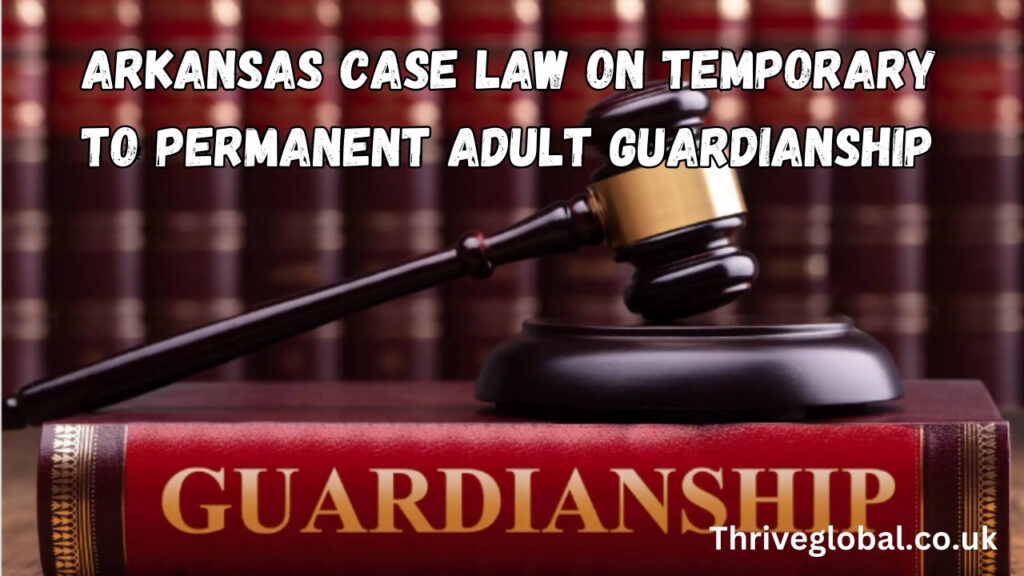Table of Contents
ToggleIntroduction To Arkansas Case Law On Temporary To Permanent Adult Guardianship
Navigating the complexities of guardianship law in Arkansas Case Law On Temporary To Permanent Adult Guardianship, especially the transition from temporary to permanent adult guardianship, requires a deep understanding of the state’s legal framework. Guardianship cases often involve sensitive and critical decisions about the care and management of individuals who cannot make decisions for themselves due to incapacity. This article delves into Arkansas Case Law On Temporary To Permanent Adult Guardianship concerning the transition from temporary to permanent guardianship, providing a comprehensive guide for legal professionals, guardians, and families.
Understanding Guardianship in Arkansas
Arkansas Guardianship Law Overview
In Arkansas, guardianship is a legal process by which a court appoints an individual (the guardian) to care for another person (the ward) who is deemed incapable of managing their own affairs. The process is governed by the Arkansas Code, particularly Title 28, Chapter 65. Guardianship can be temporary or permanent, depending on the needs of the ward and the circumstances leading to the appointment.
Types of Guardianship
There are several types of guardianship in Arkansas:
- Temporary Guardianship: This is a short-term arrangement, typically used in emergencies, where a guardian is appointed to make decisions on behalf of the ward until a more permanent solution is found.
- Permanent Guardianship: A long-term arrangement where the guardian is given ongoing responsibility for the ward’s personal and/or financial matters.
Legal Standards for Temporary Guardianship
Criteria for Appointing Temporary Guardianship
Arkansas law allows for the appointment of a temporary guardian when immediate action is required to protect the health, safety, or financial interests of an incapacitated adult. The petitioner must demonstrate that the ward is in imminent danger or that their property may be lost or damaged without such intervention.
Court Procedures for Temporary Guardianship
Temporary guardianship is often granted on an expedited basis. The court requires a petition, supported by affidavits or testimony, outlining the reasons why temporary guardianship is necessary. A hearing is typically held within a short period, and the court may appoint a guardian without the presence of the ward if the situation warrants immediate action.
Duration and Extension of Temporary Guardianship
Temporary guardianship in Arkansas is intended to be a short-term solution and is usually limited to a maximum period of 90 days. However, the court may extend this period if the circumstances justify it, although such extensions are generally scrutinized to ensure they are in the best interest of the ward.
Transitioning from Temporary to Permanent Guardianship
Legal Grounds for Transitioning to Permanent Guardianship
For a temporary guardianship to transition into a permanent one. The court must determine that the ward’s incapacity is likely to be long-term or permanent. This determination is based on medical evaluations, the ward’s condition, and the testimony of experts or those close to the ward.
Filing for Permanent Guardianship
The process to transition from temporary to permanent guardianship begins with filing a petition for permanent guardianship. The petitioner must provide clear and convincing evidence that the ward continues to require a guardian and that a permanent arrangement is in their best interest.
Court Hearing and Evidence Requirements
A full hearing is required for the court to consider the transition from temporary to permanent guardianship. During this hearing, the petitioner must present evidence, including medical reports, testimony from healthcare providers. And statements from family members or other interested parties. The court also considers the ward’s wishes if they are capable of expressing them.
Key Arkansas Case Law on Guardianship
Notable Cases Impacting Guardianship Law
Arkansas case law has shaped the interpretation and application of guardianship statutes. Several key cases provide guidance on how courts should approach the transition from temporary to permanent guardianship.
In re Guardianship of Williams
This landmark case highlighted the importance of the ward’s right to due process. The Arkansas Supreme Court ruled that before making a temporary guardianship permanent.
Matter of Estate of Wharton
In this case, the court emphasized the need for clear and convincing evidence when extending or making permanent a temporary guardianship. The ruling underscored the court’s responsibility to protect the ward’s rights while ensuring their welfare is adequately safeguarded.
Guardianship of Morgan v. Morgan
This case dealt with the complexity of family dynamics in guardianship proceedings. The Arkansas Court of Appeals stressed that the best interest of the ward should always be the primary consideration, even when family members have conflicting views on what that entails.
Challenges in Transitioning to Permanent Guardianship
Balancing the Ward’s Rights and Welfare
One of the most significant challenges in transitioning from temporary to permanent guardianship is balancing the ward’s rights with their welfare. Arkansas courts must carefully consider whether permanent guardianship is necessary and if less restrictive alternatives could serve the ward’s needs.
Dealing with Family Disputes
Family disputes often complicate guardianship cases. When family members disagree on who should be appointed as a guardian or whether a temporary guardianship should become permanent, the court must navigate these conflicts while prioritizing the ward’s best interests.
Ensuring Due Process
Ensuring that the ward’s due process rights are respected throughout the guardianship process is crucial. This includes the right to legal representation, the right to be heard in court, and the right to challenge the evidence presented by the petitioner.
Court’s Role in Guardianship Cases
Judicial Discretion in Guardianship Matters
Arkansas courts have broad discretion in guardianship cases. Judges must weigh various factors, including the ward’s capacity, the necessity of guardianship, the suitability of the proposed guardian, and the availability of less restrictive alternatives.
Appointment of a Guardian ad Litem
In cases where the ward’s interests may not be adequately represented, the court may appoint a guardian ad litem. This individual acts as an independent advocate for the ward, ensuring that their rights and interests are fully protected during the proceedings.
Review and Monitoring of Guardianship Arrangements
Even after a permanent guardianship is established, the court retains the authority to review and modify the arrangement as needed. Guardians are typically required to submit periodic reports, and the court may hold hearings to ensure that the guardian is fulfilling their duties appropriately.
Rights of the Ward in Guardianship Proceedings
Right to Legal Representation
Wards in Arkansas have the right to be represented by an attorney in guardianship proceedings. If they cannot afford an attorney, the court may appoint one to ensure their rights are protected.
Right to Participate in Hearings
The ward has the right to participate in all guardianship hearings unless the court finds that their presence would be detrimental to their well-being. This participation includes the right to present evidence, call witnesses, and challenge the evidence against them.
Right to Request Termination of Guardianship
If the ward believes that they have regained capacity, they have the right to petition the court to terminate the guardianship. The court must then hold a hearing to determine whether the guardianship is still necessary.
Best Practices for Guardians in Arkansas
Understanding Guardian Responsibilities
Guardians in Arkansas are entrusted with significant responsibilities, including making decisions about the ward’s personal care, medical treatment, and financial matters. It is essential for guardians to understand the scope of their duties. And the legal obligations that come with the role.
Maintaining Accurate Records
One of the key responsibilities of a guardian is to maintain accurate and detailed records of all decisions and actions taken on behalf of the ward. This includes financial transactions, medical treatments, and any other significant decisions. These records are crucial for the periodic reports required by the court.
Regular Communication with the Ward
Effective guardianship requires regular communication with the ward to understand their needs, preferences, and wishes. Even in cases where the ward has limited capacity, maintaining this connection is vital for ensuring that decisions are made in their best interest.
Common Issues in Guardianship Cases
Conflicts of Interest
Conflicts of interest can arise when the guardian’s personal interests conflict with those of the ward. Arkansas law requires that guardians act solely in the best interest of the ward, and any conflicts must be disclosed to the court.
Guardianship Abuse
Guardianship abuse is a serious concern in Arkansas, as in many other states. This can take the form of financial exploitation, neglect, or making decisions that are not in the best interest of the ward. The court has mechanisms in place to investigate and address allegations of abuse.
Challenges in Reversing Guardianship
Reversing a permanent guardianship can be challenging, particularly if the guardian objects to the termination. The ward or another interested party must present compelling evidence that. The guardianship is no longer necessary or that the guardian is not fulfilling their duties appropriately.
Legal Reforms and Future Directions
Recent Reforms in Arkansas Guardianship Law
Arkansas has made several reforms to its guardianship laws in recent years. Aimed at improving protections for wards and ensuring that guardianships are used appropriately. These reforms include stricter requirements for appointing guardians and increased oversight by the courts.
Proposals for Further Legal Reforms
Advocates and legal experts in Arkansas have proposed additional reforms to address ongoing challenges in the guardianship system. These proposals include enhancing training for guardians, increasing access to legal representation for wards, and improving the monitoring and oversight of guardianship arrangements.
The Role of Advocacy Organizations
Several advocacy organizations in Arkansas work to protect the rights of individuals under guardianship and to promote reforms that enhance the fairness and effectiveness of the system. These organizations provide valuable resources for guardians, wards, and their families.
Conclusion
The transition from temporary to permanent adult guardianship in Arkansas is a complex legal process that requires careful consideration of the ward’s needs, rights, and best interests. Arkansas case law provides critical guidance on how courts should approach these cases. Ensuring that guardianships are established and maintained in a manner that protects the welfare of incapacitated adults. Whether you are a guardian, a family member, or a legal professional. Understanding the nuances of Arkansas guardianship law is essential for navigating this challenging area of law effectively.
FAQs
What is the difference between temporary and permanent guardianship in Arkansas?
Temporary guardianship is a short-term arrangement, typically for emergency situations. Whereas permanent guardianship is a long-term solution for individuals who are unable to manage their own affairs indefinitely.
How can a temporary guardianship be made permanent in Arkansas?
To transition from temporary to permanent guardianship, a petition must be filed with the court, and the petitioner must provide clear and convincing evidence that the ward requires ongoing guardianship.
What are the legal rights of a ward in Arkansas?
Wards in Arkansas have the right to legal representation, the right to participate in guardianship hearings, and the right to petition the court to terminate the guardianship if they regain capacity.
Can a guardianship be reversed in Arkansas?
Yes, a guardianship can be reversed if the ward or another interested party provides evidence that the guardianship is no longer necessary or that the guardian is not acting in the best interest of the ward.
What are the responsibilities of a guardian in Arkansas Case Law On Temporary To Permanent Adult Guardianship?
Guardians in Arkansas are responsible for making decisions about the ward’s personal care, medical treatment, and financial matters, and must act in the best interest of the ward at all times.
What steps can be taken if a guardian is abusing their powers?
The court may investigate the allegations and take appropriate action, including removing the guardian if necessary.



